Archive for the ‘Current Affairs’ Category
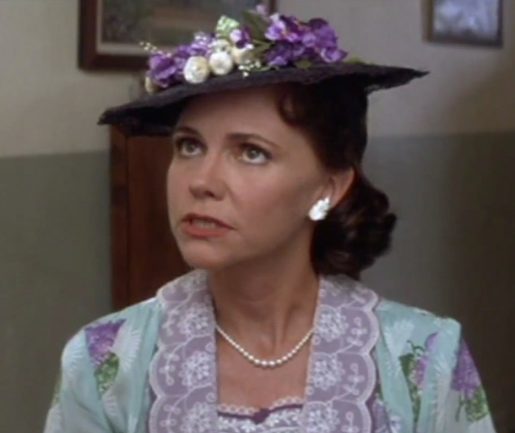
Reposted from Facebook, where I have had a lot to say, in these past weeks, about the DeVos nomination.
My objection to Betsy DeVos’s nomination was about, as I have expressed here so often, her absolute lack of public education experience and her shocking gaps in knowledge. Now that she’s been confirmed, you can bet I’ll be focusing on matters of policy. We have some serious watchdogging to do.
And you know what, I know not everyone here agrees with me on all matters of policy. Of course not. I can respect someone who takes a well-articulated, well-considered position even when I believe the position is dead wrong. But I cannot respect a Secretary of Education who doesn’t know the difference between measuring growth vs proficiency, and appears not to grasp what IDEA is and why a federal law protecting the rights of students with disabilities was necessary in the first place.
(That history is sobering. In 1970, five years before IDEA was passed, only one in five children with disabilities was educated in U.S. schools. Many states actually had laws excluding certain students from school, including students who were blind, deaf, or cognitively disabled. Today my son receives excellent, individualized instruction, adaptive physical education, speech therapy, and audiology/hearing aid services in our neighborhood middle school. The intensive physical therapy he received via Early Intervention (IDEA Part C) from age four months on is almost certainly the reason he can walk today.)
I don’t take IDEA for granted. The past two weeks have shown us how rapidly and dramatically things can change. That’s why I’ll be watching vigilantly. And speaking up, speaking out, marching, calling, mobilizing—whatever it takes.
Betsy DeVos, my eye is on you.
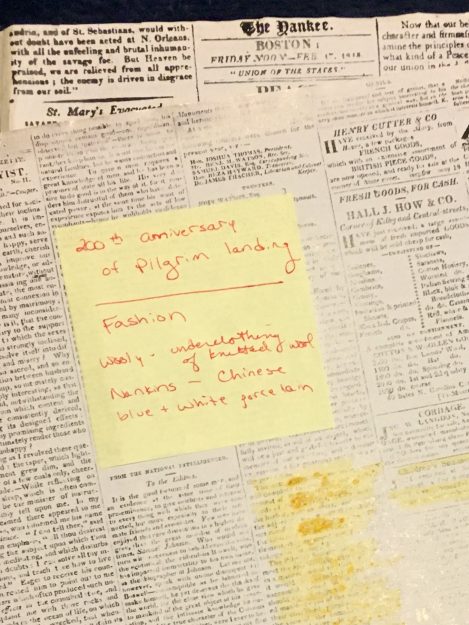
Feb. 17, 1818 Yankee article with my researcher’s sticky note still in place
I woke up to the news that the National Endowment for the Arts and National Endowment for the Humanities are among the programs slated for elimination in the new administration’s budget proposals. Not exactly a surprise, but still it smacked me in the gut, and I’ve walked around feeling ill all day.
Anyone who knows me knows why I’m sick about the scrapping of the NEA. But losing the National Endowment for the Humanities as well? Takes my breath away. If you’ve read my Charlotte books, you’ve seen one NEH project in action. The NEH funded the US Newspaper Program, which gave grants to all 50 states to preserve old, crumbling newspapers on microfilm.
Massachusetts, for example, received $770,942 in NEH support to catalog over 8000 titles, including the 1680 Publick Occurrences, America’s first newspaper. There are treasures in those archives that would have been lost to time, but for this federal funding program.
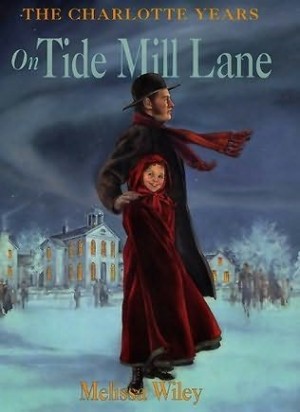 You know that hurricane I wrote about in Tide Mill Lane? I learned of it in The Yankee—including whose roof was torn off and what other damages Roxbury folks suffered. The Brighton Cattle Show, right down to all the winners? The Yankee. The vandalism of the Bible in a Roxbury church. The first gaslights in Boston. The parade, the details of the wagons and the whole celebration. The first elephant brought to North America. All that priceless historical information came right out of newspaper articles that are available on microfilm at the Boston Public Library.
You know that hurricane I wrote about in Tide Mill Lane? I learned of it in The Yankee—including whose roof was torn off and what other damages Roxbury folks suffered. The Brighton Cattle Show, right down to all the winners? The Yankee. The vandalism of the Bible in a Roxbury church. The first gaslights in Boston. The parade, the details of the wagons and the whole celebration. The first elephant brought to North America. All that priceless historical information came right out of newspaper articles that are available on microfilm at the Boston Public Library.
Jane was still going through treatment for leukemia in NY when I was researching and writing the first two Charlotte books. I couldn’t travel. My editors at HarperCollins arranged a stipend for on-site researchers who made copies for me. “ANYTHING AT ALL you can get me from the years 1800-1820,” I asked. “The whole paper, not just the news articles. I want advertisements, editorials, everything.” Amy Sklansky and Theresa Peterson put in dozens of hours printing off copies. I pored over those riches for months. I still have them—boxes of Yankee articles on that slippery microfilm paper. I use the story about the orchard thieves (“a man named Peter Twist and two well-dressed women”) in writing workshops to this day.
That’s what the NEH did for me, and for you, if you enjoyed my books. And that’s one tiny fraction of what those tax dollars funded.
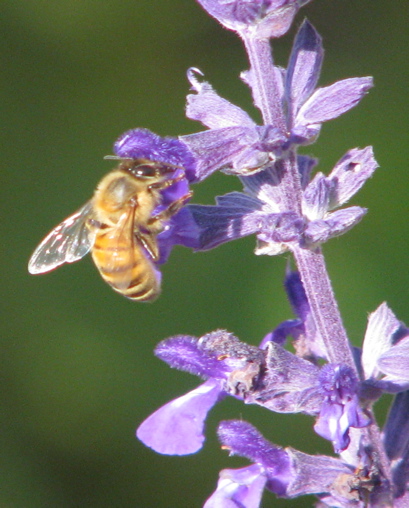
I know I’ve been singing this song for a long time, y’all, but it’s bad, bad, bad and getting worse.
Soaring Bee Deaths in 2012 Sound Alarm on Malady – NYTimes.com
“They looked so healthy last spring,” said Bill Dahle, 50, who owns Big Sky Honey in Fairview, Mont. “We were so proud of them. Then, about the first of September, they started to fall on their face, to die like crazy. We’ve been doing this 30 years, and we’ve never experienced this kind of loss before.”
When beekeepers and scientists first starting investigating colony collapse disorder, causes were uncertain. Rowan Jacobsen’s excellent book, Fruitless Fall, explores possible reasons. (Here’s one of my many posts about the book.)
Five years later, we have a much clearer idea of exactly what is happening, and it’s very bad news.
But many beekeepers suspect the biggest culprit is the growing soup of pesticides, fungicides and herbicides that are used to control pests.
While each substance has been certified, there has been less study of their combined effects. Nor, many critics say, have scientists sufficiently studied the impact of neonicotinoids, the nicotine-derived pesticide that European regulators implicate in bee deaths.
The explosive growth of neonicotinoids since 2005 has roughly tracked rising bee deaths.
Neonics, as farmers call them, are applied in smaller doses than older pesticides. They are systemic pesticides, often embedded in seeds so that the plant itself carries the chemical that kills insects that feed on it.
The pesticide is embedded in the seeds. I posted to another piece on this topic this last week, and these are just a couple of the many anxious reports I’ve picked up on my bee wire (Google Alerts, when they’re working) in the past few months. I know I’m probably preaching to the choir here, but I implore you to read up on this issue, if you haven’t yet, and to spread the word far and wide. If we lose the bees, we lose the world as we know it.
Kid-Lit Cares: Superstorm Sandy Relief Effort:
What is KidLit Cares?
It’s an online talent auction to benefit the Red Cross relief effort for Sandy. Agents, editors, authors, and illustrators have donated various services to be auctioned off to the highest bidder, with donations being made directly to the Red Cross disaster relief fund.
What kinds of things are included?
Manuscript critiques, in-person and Skype author visits, virtual writing workshops, school & library marketing consultations for authors… you name it.
See also: Six Ways for Geeks to Help with Hurricane Sandy Relief at GeekMom.
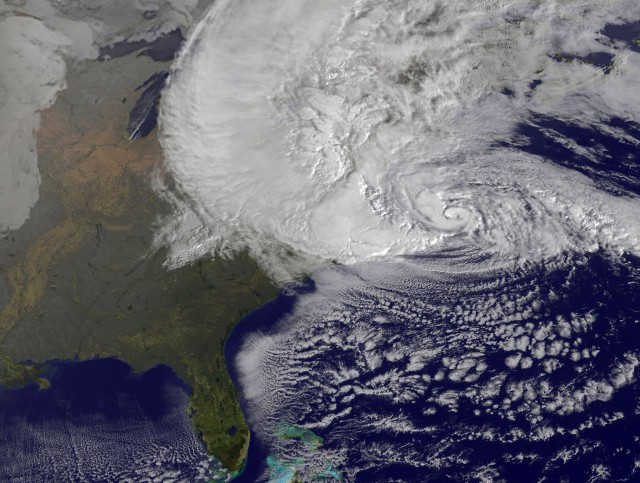
Rounding up links I’m watching today:
Severe NJ Weather (Facebook page, lots of current photos)
NPR Hurricane Sandy breaking news, frequent updates
Storify: Live Hurricane Updates
Google maps, hurricane edition
New York Times, Hurricane Sandy: View From Above (photo from 51st floor of NYT building, updated every few minutes)
Twitter feeds: @ScottBeale, @Lock (Lockhart Steele, lots of photos)
UPDATED: Live Webcams of Areas Affected by Hurricane Sandy
Feel free to share your own. Hope you weather this well, East Coast friends…
Laura Grace Weldon takes a careful, thorough look at an issue we should all be learning as much about as possible.
A few quotes—
Re safety and long-term effects:
But technically, assertions that fracking is safe are largely true. That’s because industry and government regulatory agencies use the term “fracking” only as it relates to the actual process of pumping fluids into the ground to break apart rock. So when they make claims about fracking safety, they don’t include what happens while drilling, constructing the well, setting off explosions, dealing with blowouts or well fires, storing waste water in open containment basins, vapors emitted from condensate tanks, open flaring to burn off gasses, transporting waste, injecting waste water into deep disposal wells, or at any point in the future when the wells may leak.
That’s convenient, because a University of Texas study found that these are the activities actually contaminating air, water, and soil. So both sides are “right” in the fracking debate. The industry is correct when they say that fracking is largely safe because of their limited definition of the word. People concerned about the environmental and health consequences lump all activities associated with the process under the term “fracking,” making their claims of risk correct too.
Re land rights:
But local citizens have very little control over fracking. Depending where they live, fracking may occur under cemeteries and in state parks. Some cities as well as colleges are considering lease offers. Despite regulations that normally zone residential areas apart from industrial areas, drilling can take place near homes and schools. Residents in Colorado, Texas, West Virginia, and elsewhere are advocating for stronger regulations to protect schoolchildren from the noise and dust generated by these sites. In some areas drilling sites are only required to be 350 feet from schools and 200 feet from homes. (In New Mexico, one school playground is 150 feet from a well.) No matter how vehemently citizens object, the ability to pass local ordinances regulating gas and oil producers can be superseded by state or federal regulations. This provides the industry rights normally not allowed under the law.
For example, in 38 states you can’t say no to fracking on your land if others in your area have already signed leases.
and
Some people we know who have leased their property worry that the companies owning their leases are simply speculating in land and will sell those leases to foreign companies. I held up my hand at one meeting and asked an industry representative if any leases might ever be sold to non-U.S. companies. “Absolutely not,” I was told. “This is about American energy independence.”
I came home and looked it up. All sorts of huge foreign companies are buying up rights. For example, the Australian company BHP Billiton bought 4.75 billion worth of shale assets in Arkansas, the French company Total will pay 2.25 billion for shale assets in Texas and 2.32 billion for assets in Ohio, and the Chinese firm, Sinopec, is spending billions to scoop up assets across the U.S. from firms like Devon and Chesapeake. Selling these assets is, of course, the prerogative of any company owning them.
On health concerns:
A local man stood up with a jug of brown water from his once clear well. Since his land was fracked the water has been foul smelling and murky, although state officials told him it was okay to drink. Another woman said brine was dumped on a road by her house and when she paid to have it tested it was found to contain chemicals associated with fracking, although state officials declined to investigate. I talked to many other people at these meetings: college students, farmers, retirees, mothers with small children living near active fracking sites. The information they shared was alarming. Here’s a little of what I’ve been able to confirm.
Each fracking operation takes 1.2 million gallons to 5 million gallons of water, sometimes more. Each additional time a site is fracked more water is required. Water stress (an imbalance between water use and water resources) is fast becoming an alarming global issue. When water is withdrawn from natural sources for drinking, irrigation, and other typical uses it normally finds its way back into the global water supply. But a substantial portion (15 to 40 percent) of the water used in fracking operations is left deep in the ground. What does come back up (called “flowback” as well as “produced water” which naturally occurs in shale) is often put in deep injection wells for long-term storage. This method not only edges up the potential for earthquakes, it also takes much-needed water out of planetary circulation.
and:
The fluid that comes back up also contains ingredients that didn’t go in. This means naturally occurring matter such as heavy metals, volatile organic compounds (including benzene, toluene, xylene), radioactive materials (including lead, arsenic, strontium), even acidic microbes. It also means chemical compounds created by the reactions of chemicals during any stage of the process. Claims of air, ground, and water pollution due to fracking-related activity are often dismissed by industry and government officials because some contaminants are considered “naturally occurring.” And let’s not forget the water’s salinity. Fracking wastewater has two to three times more salt than sea water and more than 180 times the level considered acceptable to drink by the EPA.
Although the industry insists that all chemicals used in fracking are on the record there are still rules in place allowing them to claim chemicals are proprietary or to disclose what’s used only after the drilling has been completed. In several states including Pennsylvania and Ohio, physicians are bound by a “gag rule” which prevents doctors from sharing information about symptoms, diagnoses, and disease clusters related to fracking chemicals even with other doctors and public health officials.
There’s a great deal more—it’s well worth your time to read the whole article. What Laura’s doing in this piece is what we talk so often about wanting to teach our children to do: ask probing questions, research deeply, consider the evidence carefully, think critically.
J.K. Rowling on paying taxes:
…the first time I ever met my recently retired accountant, he put it to me point-blank: would I organise my money around my life, or my life around my money? If the latter, it was time to relocate to Ireland, Monaco, or possibly Belize.
I chose to remain a domiciled taxpayer for a couple of reasons. The main one was that I wanted my children to grow up where I grew up, to have proper roots in a culture as old and magnificent as Britain’s; to be citizens, with everything that implies, of a real country, not free-floating ex-pats, living in the limbo of some tax haven and associating only with the children of similarly greedy tax exiles.
A second reason, however, was that I am indebted to the British welfare state; the very one that Mr Cameron would like to replace with charity handouts. When my life hit rock bottom, that safety net, threadbare though it had become under John Major’s Government, was there to break the fall. I cannot help feeling, therefore, that it would have been contemptible to scarper for the West Indies at the first sniff of a seven-figure royalty cheque. This, if you like, is my notion of patriotism.
Jo Knowles on why (taxpayer-funded) libraries are vitally important:
Now I read about budget cuts. School libraries laying off their librarians. Closing the library doors altogether. City libraries shutting down. Library systems disappearing. New York. New Jersey. California. Pennsylvania. No more free books for people desperate to put a picture book in their child’s hand. No more computer access to the kids who don’t have them at home. No more wireless for the people who’ve lost their jobs and need a place to hook up to job search. No more free access to newspapers for the people who don’t have TV and can’t afford the paper. But want to know what’s happening in the world, in their state, in their town. Who want to make informed voting decisions. Who want to understand what’s going on.
Libraries aren’t just about book lending. They are the heart of most communities. They are the one place in any community that you can go all year, rain or shine, rich or penniless. They are the one place in communities that provide fair and equal access. They don’t discriminate. They don’t judge. They give over and over and over.
And now is when they are needed most desperately. Now is when they provide the most valuable services. Now is when, even if a state or county is so far in the red they feel they’ll never get out, now is when libraries should be getting the green light to extend their hours, not have them taken away. Without libraries, the economic divide in our communities grows even wider. Please. If the library in your community is in danger, speak up. If you can help any library that’s in trouble, please do it. This is about kids, babies, new moms and dads, unemployed parents, a lonely retired person who needs weekly or daily interaction and reading material to get them through the week. It’s about keeping communities intact. Your community. My community. It matters.
We celebrated tax day today with a trip to the public library. I’d say more, but I have a date to read Inside Outside Upside Down with a certain little boy.
The other day, Scott pointed out that we, all of us, haven’t yet settled upon a name for this decade. You know, like the Eighties, the Nineties, and so forth. I remember speculating about this in 1999, wondering if the decade-about-to-dawn would be called the Aughts like the first decade of the 20th century. It seemed too quaint to be possible—and too quaint it must have been indeed, because I don’t think I’ve ever heard anyone use “the Aughts” this time around.
In 1999 my HarperCollins editor was going over publishing schedules with me, and she referred to the year 2002 as “2K2.” Evidently that’s how they were referring to the dates of the new century there, at that time, for a while. I don’t think it stuck. (I should ask.) I remember telling Scott about it after I got off phone and saying, “Do you think that’s what we’ll all say, instead of Two Thousand and Two?”
We didn’t. Whew.
But what are we going to say ten years from now, when the Teens are winding down? “Twitter? It came along in the Aughts.” The Os? The Zeros?
Ha, I just looked up “Aughts” to make sure I was spelling it right and it seems there’s a Wikipedia entry on this very topic. Wikipedia suggests we’ll be calling this decade “the 2000s.” That just seems silly to me. Speaking of silly, this line made me laugh:
“Unlike previous decades such as ‘The Fifties,’ ‘The Seventies,’ and ‘The Nineties,’ the 2000s never attained a universally accepted name in the English-speaking world.”
Seem a bit presumptuous to you? The decade’s not over yet and we’re already declaring it “never attained a universally accepted name”? Surely once a little time has passed we’ll settle upon a way to talk about this crazy, tumultuous span of years. Wikipedia says, and Scott mentioned this too, that some wags have suggested we call it the Noughts or the Noughties to reflect both the zeroes in the digits and the tanking economy. I can see that taking off in the UK but my guess is we Americans will wind up saying the Os. Or do I mean the Ohs?
Like many people, I’m still reeling from the bizarre, ill-considered piece of legislation that recently went into effect which (among other things) makes it illegal for Americans to buy, sell, or barter children’s books published before 1985.
I graduated from high school in 1986. That means all the books I read growing up, all the precious copies my sisters and I absconded with when we left home and all the ones waiting for our kids in our old bedroom closets, could now be considered, according to the Consumer Product Safety Improvement Act (CPSIA), a form of hazardous waste. It is against the law to sell them and possibly even to give them away.
Quite often on this blog I find myself encouraging readers to look for certain out-of-print gems, children’s books I think no child should miss. Some of these books were published in the dark ages—that is, prior to 1985. There’s no point in my recommending them anymore; no one can sell them to you.
Which is a very great pity.
Alicia at Love2Learn began a meme for sharing treasured titles CPSIA now makes illegal to sell or swap. Here are some of our favorites. I’m sorry you can’t buy them anymore, even from used vendors at Amazon Marketplace.
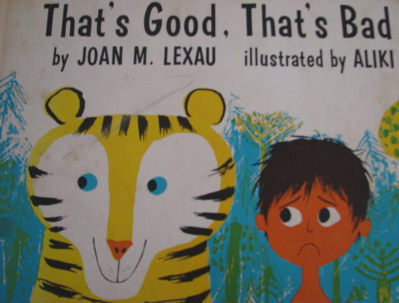
That’s Good, That’s Bad by Aliki. I posted about this beloved picture book here—beloved especially by Scott. This is his childhood copy, fragile now, kept on a high shelf and read at special times with great ceremony.
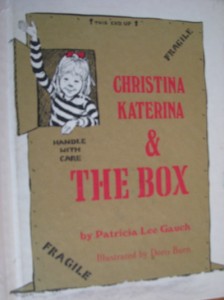 Christina Katerina and the Box by Patricia Lee Gauch. This one belonged to my sisters and me, growing up, and I’ll probably be in trouble when they read this post and discover I snagged it from our parents’ basement. One of my favorite picture books ever because it rings so true. Christina’s mother gets a refrigerator and lets her play with the box, aka the pirate ship/clubhouse/racecar/ballroom/etc etc etc. It sort of drives the mother crazy, and I can so relate to that, wanting on the one hand to allow the kids to play the superawesome game they’ve got going with the big old cardboard box that takes up half the living room, but on the other hand THERE’S A BOX TAKING UP HALF THE LIVING ROOM. When Scott really wants to get my goat he’ll tell me I’m being like Christina Katerina’s mom.
Christina Katerina and the Box by Patricia Lee Gauch. This one belonged to my sisters and me, growing up, and I’ll probably be in trouble when they read this post and discover I snagged it from our parents’ basement. One of my favorite picture books ever because it rings so true. Christina’s mother gets a refrigerator and lets her play with the box, aka the pirate ship/clubhouse/racecar/ballroom/etc etc etc. It sort of drives the mother crazy, and I can so relate to that, wanting on the one hand to allow the kids to play the superawesome game they’ve got going with the big old cardboard box that takes up half the living room, but on the other hand THERE’S A BOX TAKING UP HALF THE LIVING ROOM. When Scott really wants to get my goat he’ll tell me I’m being like Christina Katerina’s mom.
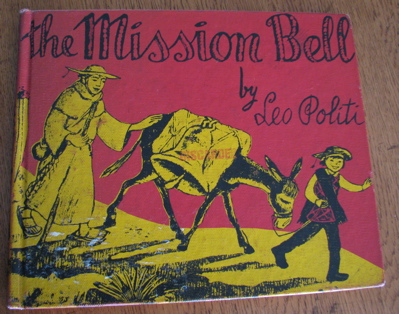
The Mission Bell by Leo Politi. A gem of a book about a California mission, a gift for Wonderboy from his godmother a few months ago. Good thing she sent it before February 9th.
 Johnny Crow’s Garden by Leslie Brooke. I wrote about this absolute masterpiece of a picture book last year: read about it in Noel Perrin’s A Child’s Delight, ordered it online from a seller of used books—something it is now illegal to do—and about jumped out of my skin with excitement when it arrived and I saw the illustrations and remembered reading the book as a child. “A stork…gave a philosophic talk…in Johnny Crow’s garden.” Rilla adores it now and the older girls chuckle as I read it to her, so amusing is the text. Oh, I’m so very sad that you can’t all run straight to Amazon Marketplace and order a copy. This is so wrong.
Johnny Crow’s Garden by Leslie Brooke. I wrote about this absolute masterpiece of a picture book last year: read about it in Noel Perrin’s A Child’s Delight, ordered it online from a seller of used books—something it is now illegal to do—and about jumped out of my skin with excitement when it arrived and I saw the illustrations and remembered reading the book as a child. “A stork…gave a philosophic talk…in Johnny Crow’s garden.” Rilla adores it now and the older girls chuckle as I read it to her, so amusing is the text. Oh, I’m so very sad that you can’t all run straight to Amazon Marketplace and order a copy. This is so wrong.
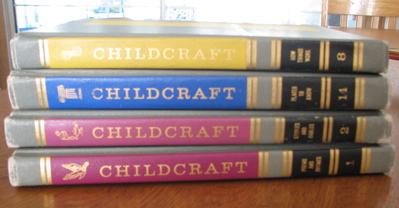
When I first started reading homeschooling message boards, people were always talking about the Childcraft books, a set of encyclopedias organized by topic. Occasionally someone would score a set at a yard sale and there would be much envious oohing by the other moms. Imagine my delight when Scott’s mother produced a complete set from her attic, one summer day: “Would you like these for your kids?” Scott (who knew nothing of the online buzz) whooped and said “THERE THEY ARE! I loved those books!” and I whooped and said “I’ve heard so much about those books!” and of course we snatched them up. I think Jane has read the whole set cover to cover. We love them. They are in frequent use.
It’s against the law to sell them now, even at a yard sale.
The meme roundup at Love2Learn has many links to more information about CPSIA, including the advice to contact your congressman.



 You know that hurricane I wrote about in Tide Mill Lane? I learned of it in The Yankee—including whose roof was torn off and what other damages Roxbury folks suffered. The Brighton Cattle Show, right down to all the winners? The Yankee. The vandalism of the Bible in a Roxbury church. The first gaslights in Boston. The parade, the details of the wagons and the whole celebration. The first elephant brought to North America. All that priceless historical information came right out of newspaper articles that are available on microfilm at the Boston Public Library.
You know that hurricane I wrote about in Tide Mill Lane? I learned of it in The Yankee—including whose roof was torn off and what other damages Roxbury folks suffered. The Brighton Cattle Show, right down to all the winners? The Yankee. The vandalism of the Bible in a Roxbury church. The first gaslights in Boston. The parade, the details of the wagons and the whole celebration. The first elephant brought to North America. All that priceless historical information came right out of newspaper articles that are available on microfilm at the Boston Public Library.


 Christina Katerina and the Box by Patricia Lee Gauch. This one belonged to my sisters and me, growing up, and I’ll probably be in trouble when they read this post and discover I snagged it from our parents’ basement. One of my favorite picture books ever because it rings so true. Christina’s mother gets a refrigerator and lets her play with the box, aka the pirate ship/clubhouse/racecar/ballroom/etc etc etc. It sort of drives the mother crazy, and I can so relate to that, wanting on the one hand to allow the kids to play the superawesome game they’ve got going with the big old cardboard box that takes up half the living room, but on the other hand THERE’S A BOX TAKING UP HALF THE LIVING ROOM. When Scott really wants to get my goat he’ll tell me I’m being like Christina Katerina’s mom.
Christina Katerina and the Box by Patricia Lee Gauch. This one belonged to my sisters and me, growing up, and I’ll probably be in trouble when they read this post and discover I snagged it from our parents’ basement. One of my favorite picture books ever because it rings so true. Christina’s mother gets a refrigerator and lets her play with the box, aka the pirate ship/clubhouse/racecar/ballroom/etc etc etc. It sort of drives the mother crazy, and I can so relate to that, wanting on the one hand to allow the kids to play the superawesome game they’ve got going with the big old cardboard box that takes up half the living room, but on the other hand THERE’S A BOX TAKING UP HALF THE LIVING ROOM. When Scott really wants to get my goat he’ll tell me I’m being like Christina Katerina’s mom.
 Johnny Crow’s Garden by Leslie Brooke. I
Johnny Crow’s Garden by Leslie Brooke. I 